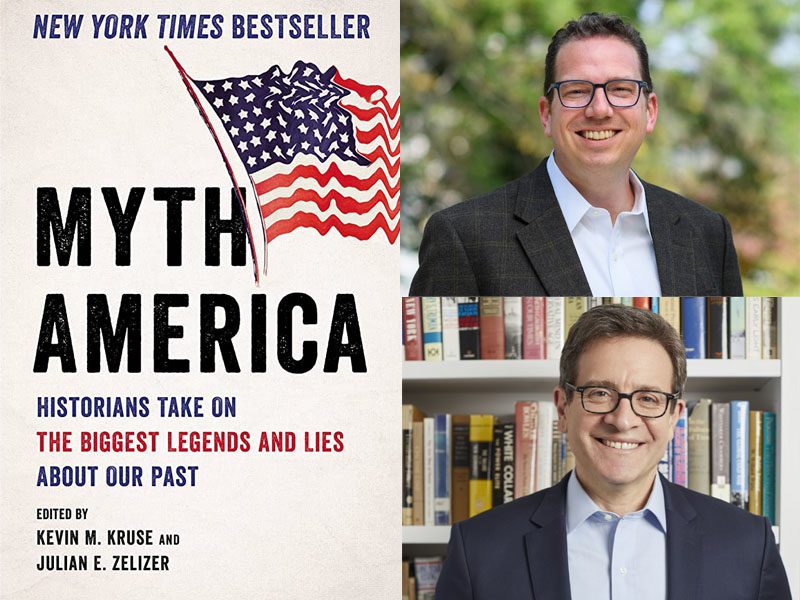Kevin M. Kruse is Professor of History and Julian Zelizer is Professor of History and Professor of Public Affairs in the Princeton School of Public and International Affairs. Their edited collection “Myth America: Historians Take On the Biggest Legends and Lies About Our Past” was published in January 2023 by Basic Books.
How did you get the idea for this project?
Zelizer: Watching the disconnect between claims about American history being made in the media and what we read from the academy gave us the idea of putting together this book. We wanted to showcase some of the nation’s best historians tackling issues such as immigration and race relations who could offer a more accurate interpretation of the nation’s past based on archival research and the historical literature.
Kruse: Over the past decade, partisan actors have increasingly made claims about American history that simply don’t fit with what actual historians know to be true. While it spread beyond the Trump White House, the former president fueled a great deal of this assault on American history. This happened in small ways, with myths and misstatements filling his speeches and those of aides, but also in large ways, such as the “1776 Commission” he established in the final months of his presidency to push for “patriotic education.” And it’s continued after his term, seen in the efforts of Republican governors in several states. In response to this all-out assault on history, large numbers of prominent historians have sought to correct the record, working in traditional media outlets as well as newer social media formats like Facebook, Twitter, and Substack. We sought to harness that energy in an edited collection that would represent what we do best—writing work grounded in the archives and the historical consensus for a general audience.
How has your project developed or changed throughout the research and writing process?
Kruse: The project took shape in 2019–2020 during the last years of the Trump administration but was largely written and edited in the years after, which provided us a little distance from the inspiring incidents—but also a sense that the controversies would continue without Trump.
Zelizer: The scope of issues expanded as we put this together and many of our authors, such as Ari Kelman, offered powerful pieces with arguments we had not originally considered when putting this together.
What questions for future investigation has the project sparked?
Kruse: There are certainly more myths out there to address, and future projects in this vein will surely respond to their own moment, resulting in works that tackle myths from other corners of American politics and on other subjects.
Zelizer: Continuing to bring the work of top historians who are in the academy into the public spotlight to help create a more grounded and substantive debate about the implications of our history.
Why should people read this book?
Kruse: Our understanding of the past shapes, in large part, our understanding of the present and our imagination about the future. Having a clear sense of where we’ve been is essential to determining where we go next.
Zelizer: Most important, the essays are just a good read! For fans of American history, these are terrific and powerful essays which inform and are engaging. Moreover, with the history profession under attack, this volume offers a good look at the top-quality work that is being produced and taught these days.
Learn more about other publications by Princeton University faculty in the humanities by exploring our Faculty Bookshelf.
















